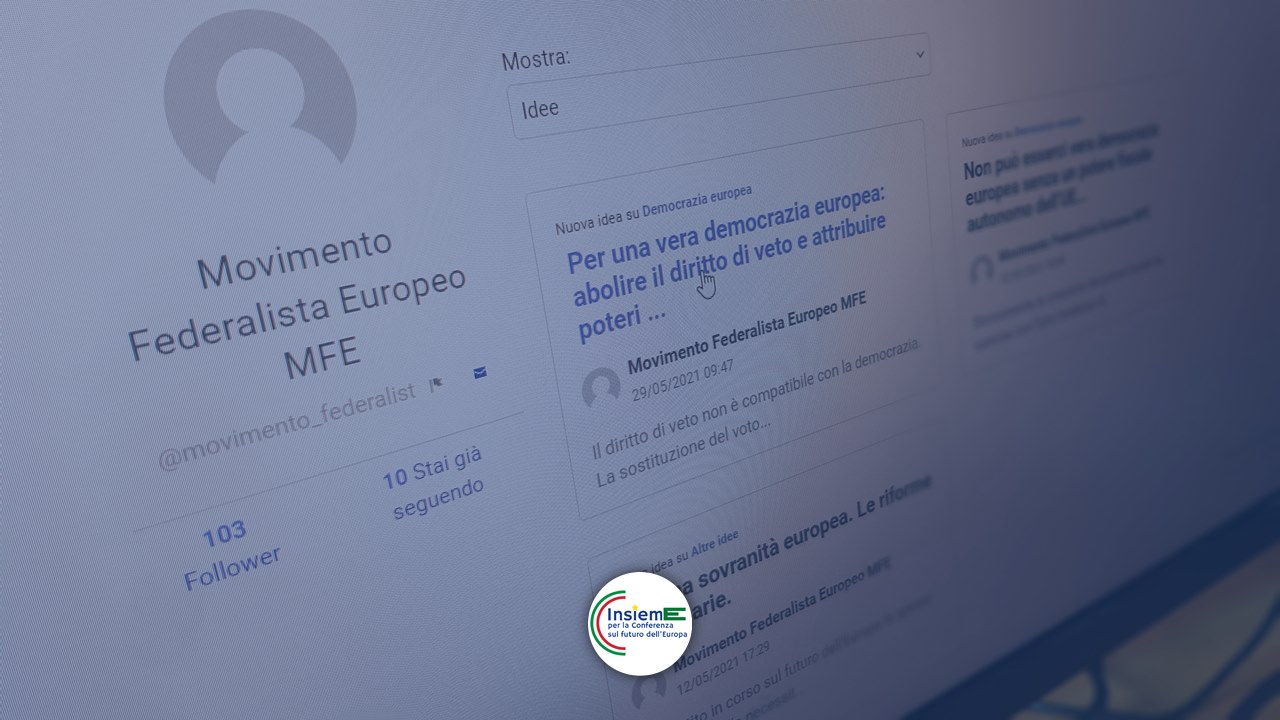
Le proposte federaliste alla Conferenza sul futuro dell'Europa
Durante i lavori della Conferenza sul futuro dell'Europa (CoFoE), il Movimento Federalista Europeo (MFE) si è battuto perché all’interno della potesse svilupparsi un dibattito sulla necessità di rivedere i trattati dell'UE per rafforzare la democrazia europea e mettere l’UE in grado di agire con efficacia.
L'MFE, in coordinamento con l’Unione dei Federalisti Europei (UEF), ha partecipato attivamente alla CoFoE con proposte politiche pubblicate nella piattaforma multilingue futurEU.europa.eu, organizzando decine di incontri sul territorio e con la presenza nei panel europei dei cittadini e nelle sessioni plenarie per promuovere tali proposte.
La seduta plenaria che sabato 30 aprile 2022 ha concluso i lavori della Conferenza ha accolto l'idea che si debba rimettere mano ai trattati, inserendo nel suo documento finale alcune delle proposte dei cittadini che vanno in tal senso, comprese quelle dei federalisti europei.
| Le proposte del Movimento Federalista Europeo (MFE) |
L‘obiettivo comune delle proposte federaliste è la creazione di un bilancio europeo finanziato da imposte raccolte a livello europeo, fondamentale per lo sviluppo dei beni comuni europei, sostenere gli investimenti europei e far fronte alle crisi finanziarie.

Storicamente la creazione del potere fiscale ha coinciso con l’atto fondativo di una comunità politica, e ha richiesto un forte controllo democratico su chi lo esercita; per questo le società democratiche hanno sempre richiesto che il potere fiscale venisse esercitato dal parlamento. Oggi l’attribuzione del potere fiscale al Parlamento europeo (insieme al Consiglio dell’UE, in base alla procedura legislativa ordinaria) è una condizione indispensabile per la costruzione di un’Unione europea dotata di efficacia nell’azione politica e pienamente democratica. Attualmente, il bilancio UE dipende dalla volontà dei singoli Stati membri. Per quanto riguardo le entrate, l’art. 311 TFUE stabilisce che il sistema delle risorse proprie sia deciso dal Consiglio all’unanimità e che in seguito la decisione sia approvata dai singoli Stati membri conformemente alle rispettive norme costituzionali. In tale procedura l’organo rappresentativo dei cittadini – il Parlamento europeo – viene solo consultato e ogni governo mantiene il diritto di veto sulla questione delle risorse trasferite e poi utilizzate dal bilancio UE. Per approfondire: "Il finanziamento dell'Unione Europea" |

Il diritto di veto non è compatibile con la democrazia. La sostituzione del voto all’unanimità con quello a maggioranza qualificata è pertanto indispensabile per la piena democratizzazione dell’UE. Negli attuali Trattati, in particolare, l’unanimità è sempre prevista in ambiti cruciali: quello della fiscalità (dove l’ammontare del bilancio dell’UE e la natura ed entità delle risorse che lo finanziano sono decisi dal Consiglio all’unanimità e tale decisione deve poi essere ratificata da tutti gli Stati membri; come pure l’unanimità è richiesta per l’approvazione del Quadro Finanziario Pluriennale) e quello della politica estera e di difesa (nel quale ogni decisione è presa dal Consiglio o dal Consiglio europeo all’unanimità). Per approfondire : "Abolire il diritto di veto" |

Il dibattito in corso sul futuro dell’Europa fa spesso riferimento alla necessità di creare una sovranità europea in quei campi in cui le politiche nazionali non riescono più ad essere efficaci. Poiché la sovranità è in ultima istanza legata al potere di agire, è necessario affrontare il tema di come rendere efficace il governo europeo per poter attuare quelle politiche interne ed estere che gli Europei devono condurre in modo unitario per proteggere i propri valori e i propri interessi. A questo scopo è necessaria una riforma dei Trattati che permetta di superare l’attuale subordinazione del funzionamento dell’UE alla volontà politica unanime degli Stati membri. In questa ottica la riforma prioritaria è l’attribuzione di un potere fiscale all’UE, la quale deve essere dotata della capacità di raccogliere direttamente risorse e di spenderle nell’interesse generale. In questo senso deve essere attribuito al Parlamento europeo, in codecisione con il Consiglio, il potere di imporre direttamente imposte europee sui cittadini e sulle imprese dell’Unione europea. Per approfondire: "La riforma dell'Unione Europea" |
| Le proposte dell'Unione dei Federalisti Europei (UEF) |

Historically, the creation of fiscal power has coincided with the founding act of a political community, and has required strong democratic control over who wields it; hence democratic societies have always required fiscal power to be exercised by parliament. Today, the attribution of fiscal power to the European Parliament (together with the Council of the European Union, under the ordinary legislative procedure) is an indispensable condition for building an effective and fully democratic European Union. At present, the EU budget depends on the will of the individual member states. On the revenue side, Article 311 TFEU stipulates that the system of own resources shall be decided by the Council unanimously and that the decision shall then be approved by the individual Member States in accordance with their respective constitutional requirements. In this procedure, the representative body of the citizens - the European Parliament - is only consulted and each government retains the right of veto on the issue of resources transferred and then used by the EU budget. |
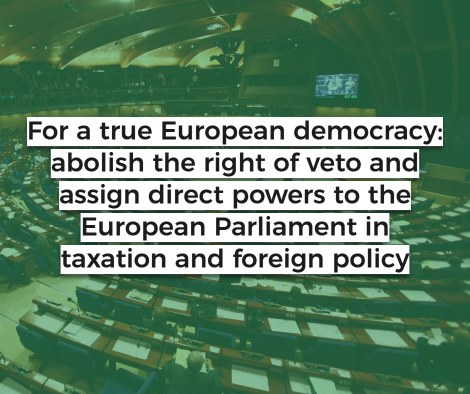
Democracy is not compatible with the right of veto. Replacing unanimity with qualified majority decisions is therefore one of the indispensable reforms for the full democratisation of the European Union. In the current Treaties in particular, unanimity is still required in two crucial areas: taxation (where the size of the Union budget and the nature and extent of the resources that finance it are decided unanimously by the Council and this decision must then be ratified by all the member states; unanimity is also required for approval of the Multiannual Financial Framework) and foreign and defence policy (where every decision is taken by the Council or the European Council with the unanimous consent of all the states). In these two areas, the time has come to structurally change the EU's decision-making system and abolish the unanimity rule. This means replacing the current forms of coordination between the national governments (which are the real cause of the existence of the veto right) with a fully democratic European government, accountable to and controlled by the European citizens. For this to happen - in addition to reforming the decision-making system in the Council and the European Council - the European Parliament must be given direct power so that it can assume the role of co-legislator and so that the Union can legislate on these matters through acts directly applicable in the member states. |
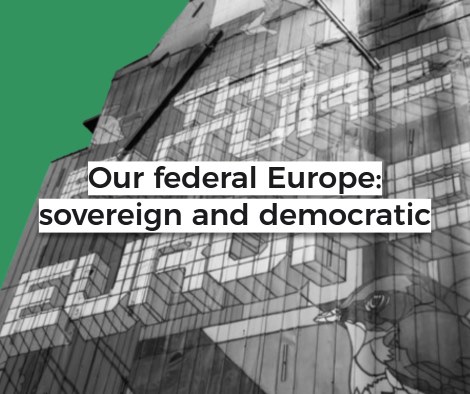
We enthusiastically welcome the start of the Conference on the Future of Europe. We are living in a historical moment of great change. It is at a time like this that communities must be able to adapt their institutions if they are to govern the new processes and avoid falling into irreversible decline. This is what we have to do today in the European Union: making the instrument of the Next Generation EU permanent and creating a federal budget, so that the EU can share fiscal sovereignty with the Member States; and acquiring new competences, extending the ordinary legislative procedure, in the fields of health, economic policy, foreign policy and defence, to make Europe a global leader in the defence of fundamental values and the rule of law, a model of a socially sustainable ecological transition and a global actor for a new multilateralism. For this reason, the Conference must be able to discuss without taboos not only which European policies need to be strengthened, but also which treaty reforms are necessary to equip the EU with the necessary tools to act effectively and incisively. Read the appeal of the UEF and the Spinelli Group of the European Parliament: https://bit.ly/3atwTjd |
| Le proposte dei Young European Federalists (JEF) |
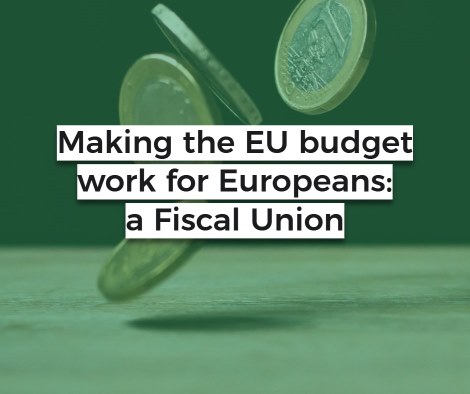
Over 70% of the EU budget’s revenues come from the member states based on their Gross National Income (GNI), i.e. all the money earned by each country’s residents and companies annually. This means that the EU funds are largely dependent on the changing economic situation and the political will of each member state. Every 7 years, the member states decide on the EU’s long-term budget, often prioritising their narrowly-defined interests over the common good of all Europeans, including the possibility to block the adoption of the budget entirely by a single national government. The EU should become a Fiscal Union with an independent budget large enough to fund its own policies. This should be based on the Union’s capacity to collect taxes and issue debt. Such a solution will strengthen the resilience of the EU to economic crises and let it provide public goods to all Europeans, while respecting the principle of subsidiarity, i.e. ensuring the EU acts only in the areas where it has more added value than national or local governments. The introduction of new EU taxes should be based on a co-decision of the European Parliament and the Council, with no right to block it by a single member state. The currently discussed EU taxes as part of the post-pandemic recovery plan on plastic, carbon, financial transactions, and activities of digital companies should be swiftly adopted, maintained as permanent instruments and complemented with new own resources in the future. |
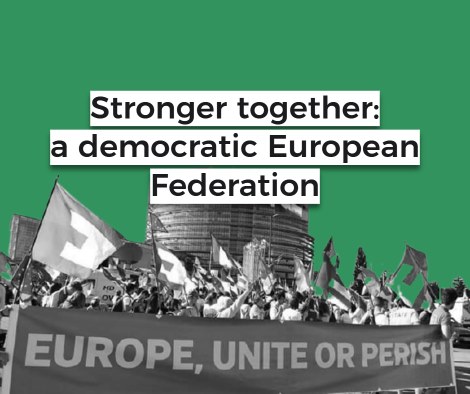
European integration originated on a continent ruined by World War II to bring peace, prosperity & social justice to Europeans. Yet, after over 70 years, the process is still unfinished, with many countries outside of the Union and the EU itself divided and lacking competences in key areas. As a result, the EU can’t reach its full potential to serve citizens at home and promote its values abroad. A united Europe can do more than any country alone in such areas as peace and security, climate action, economic stability, migration, human rights and public health, to name a few. A Constituent Assembly should develop a European Constitution defining the key elements and principles of a democratic European Federation, including: Respecting the principle of subsidiarity, the federal institutions should have competences only in the areas where they can provide more added value than their national or local counterparts. The European Federation should gradually embrace the whole continent in a democratic enlargement process and support similar integration efforts globally. |

